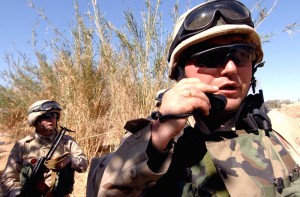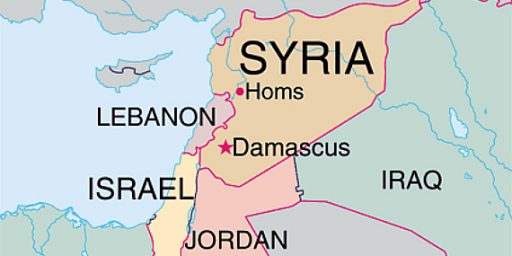Iraq War Now Peacekeeping Mission?
 Michael J. Totten weighs in on the Iraq War is Over and We Won argument and decides that, while he’s “reluctant” to answer that question in the affirmative, “The war in Iraq is all but over right now, and it will be officially over if the current trends in violence continue their downward slide. ”
Michael J. Totten weighs in on the Iraq War is Over and We Won argument and decides that, while he’s “reluctant” to answer that question in the affirmative, “The war in Iraq is all but over right now, and it will be officially over if the current trends in violence continue their downward slide. ”
[Michael] Yon is braver than the rest of us for declaring the war over, but it’s important to understand that there are no final battles in counterinsurgencies and it’s impossible to pinpoint the exact dates when wars like this end. The anti-Iraqi insurgency — a war-within-a-war — really is effectively over. As long as another such war-within-a-war doesn’t break out, Yon will appear more perceptive than the rest of us in hindsight when the currently low levels of violence finally do taper off into relative insignificance.
The problem, which I noted in my post on the subject, is that, given the possibility that the Mahdi Army could end its ceasefire at any moment or another spectucular event could reignite sectarian fighting (Totten notes that there have been zero such fatalities since April), there’s no way to distinguish a lull from closure. He observes that NATO has not fully secured Kosovo nine years after the end of major combat operations there, and that conflicts in Lebanon, Algeria, and Palestine have an on again, off again nature that’s almost wholly unpredictable.
What most of us still think of as “war” in Iraq is, at this point, a rough and unfinished peacekeeping mission. Whether it is officially over or not, it has certainly been downgraded to something else, and it’s about time more analysts and observers are willing to say so.
The problems with that are manifold. While there’s relative peace at the moment, there has been no cessation of hostilities. Terrorist attacks continue, obviously. More importantly, it’s not even clear who the parties are who would have the ability to negotiate and sign an armistice. It simply doesn’t feel like a peacekeeping mission. Until we’ve got a better handle on Muqtada al-Sadr and company, it’s just too early to break out the blue berets.
Moreover, we haven’t achieved our mission. Once Saddam’s regime was toppled and it was clear that his WMD program was more notional than real, the tangible goals of the war were achieved. We’ve remained in the last four plus years, and took the lion’s share of our casualties, fighting for something more abstract and elusive: a stable democracy capable of governing a unified Iraq without our assistance.
Security is a precondition for that goal, which was the impetus behind the Surge. But, thus far, there’s not a whole lot of evidence that the Maliki government has built much sectarian consensus. Elections are scheduled for October 1st that could conceivably be a major step in that direction but, alas, they can’t even agree on the rules for said election. Of course, there’s only so much that the United States can do to move that process along. Horses, water, and all that. There’s even less that the United States military can do.
If the primary purpose of American combat troops at this stage is simply continuing to give the Iraqi politicians breathing room to build consensus, then Totten’s right: it is mostly a stability and security operation at this point more than a traditional counterinsurgency.
Mike Mullen, the Chairman of the Joint Chiefs, said this yesterday:
“I won’t go so far as to say that progress in Iraq from a military perspective has reached a tipping point or is reversible — it has not, and it is not,” Mullen told a Pentagon press conference. “But security is unquestionably and remarkably better. Indeed, if these trends continue I expect to be able early this fall to recommend to the secretary and the president further troop reductions,” he said.
At the same time, Secretary of Defense Bob Gates was warning against the militarization of foreign policy and stressing the need for civilian leadership under the State Department and moving the military to a support role.
So maybe, just maybe, we’re making the transition from Thomas Barnett’s Leviathan force to the SysAdmin force. Time will tell whether we’ll need to switch back into kinetic mode.
U.S. Army photo by Sgt. Timothy Kingston





The thing is, there are five major obstacles to stability that still exist in Iraq:
1) al-Sadr’s coalition is still out there, and I wonder if it’s ceasefire will survive the October elections–I have my doubts.
2) The Sunni tribes that we have, essentially, paid to stop fighting. What happens when we stop paying or they decide to fight again? Again, October is key here.
3) The Kurds, who are essentially a quasi-independent nation and have announced their willingness to declare such if they feel like the national government isn’t serving their interests.
4) Maliki’s own governing coalition, which is using the army as less of a national security force and more of a political party security force. Maliki is clearly moving things in a direction of using intimidation to ensure his party’s victory in October, which, given #s 1-3 above, definitely poses a problem.
5) Local strongmen–some with U.S. backing who exist pretty much independent of the national government and will almost certainly be a problem down the road.
One thing of note–there’s not much that our forces can do about any of these problems.
It seems that the history of the Mahdi army (rogue elements, or otherwise) would create some optimism. They have consistently been beaten badly every time they attempt to cause trouble. Given that a great deal of these defeats have recently been delivered by the Iraqi army, it just doesn’t seem like the Mahdi army is a viable threat. The Iraqi army appears to be up to the task alone, but if combined with undistracted U.S. forces I would guess they would be quickly destroyed.
Maybe we need to just declare victory in the Balkins and shift those 1,000 US troops over to Afghanistan. At least if Bush declares that Iraq is now just “a peackeeping mission” then we can be stuck in this administration’s apparently never ending mission.
You mean the same Mahdi army who was instructed by al-Sadr to stand down and not fight? Sadr has made it clear that he’s giving the October election a chance. But if Maliki keeps moving down the intimidation and power consolidation path, the aftermath of the October elections could be very, very bloody.
Didn’t Tojo also instruct his army to stand down and not fight? Tojo didn’t run off and hide in Iran, however. This guy is an incompetent pseudo warlord with a third rate military operation. Don’t build him up to be superman.
Tojo wasn’t running for President.
the Iraq war is over,,, it does not matter about Mahdi Army / sadar ceasefire,,, it can never turn back into massive sectarian fighting and that’s why sadar/ Mahdi army had the ceasefire,, do you no why,,, that’s because the cement wall around sadar city,,
the cement walls was put up all the way around sadar city,,, that is because after you build a cement wall all the way around the city, they can not get any more ammo or rockets into the city,,, so if they where to keep on fighting, they would of run out of weapons after 2- 4 months, that is why they cooled a ceasefire,,, they new it would cut of there weapons supply,,,
so now that the cement wall is in place they go door to door with sniffer dogs and take away all weapons and have 100% stoped sadar people once and for all ,,,,,…
this is why the sadar and Mahdi army can never make violence like that ever again.
Iraq war is over and the next thing to do is withdraw 70,000 troops and send 60,000 to Afghanistan and win that war with them tactics used in Iraq with new tactics for a country like Afghanistan.
Iraq government wants American troops out of Iraq, al-maliki wants the American troops out ASAP,
Why is that,,,,,
What would you do if all the American troops left and you where in power, do you think that al-maliki wants to become the next saddam Hussein, or does he just wand to rule Iraq.
American troops have to stay in Iraq for at least the next 20-30 year to have a democratic Iraq, and al-maliki knows this.
If America left Iraq would you see al-maliki trying to run Iraq, why does he want American troops out ASAP,,, is that because he wants to hold onto power, and would be forced to have far elections if American troops where still there in big numbers.
even if he did not want to do that, all you have to do is look back in time.
Look at Germany, after ww1 Britain did not stay around to put it right, and what happened,,, Hitler, I am not saying he will be a Hitler, but look at how easy evil will take back over, and there are a lot of evil men in Iraq and Iraqis government.
There is no way that American troops can just leave Iraq 4 months after the government of Iraq has started to take back control of Iraq,, that would be nuts.
no matter what, American troops must stay in Iraq for at least 20-30 years, and must hold 80% of there air support, then they could just leave 25,000- 30,000 troops on the ground and could
Stop a uprising of power.
You can never invade a country and put a new government in place within 5 years and leave it in power, let alone a government that has had power for 4 months really,,, to think it will work you would be crazy,,
I do not see how al-maliki can say that they should leave Iraq after really holing some power after 4 months,,,,,,,,, It makes me wounder what al-maliki and his government really wants to do.